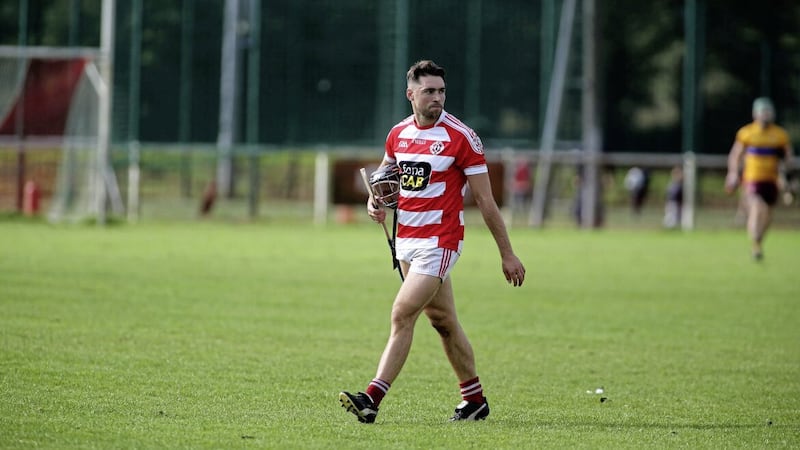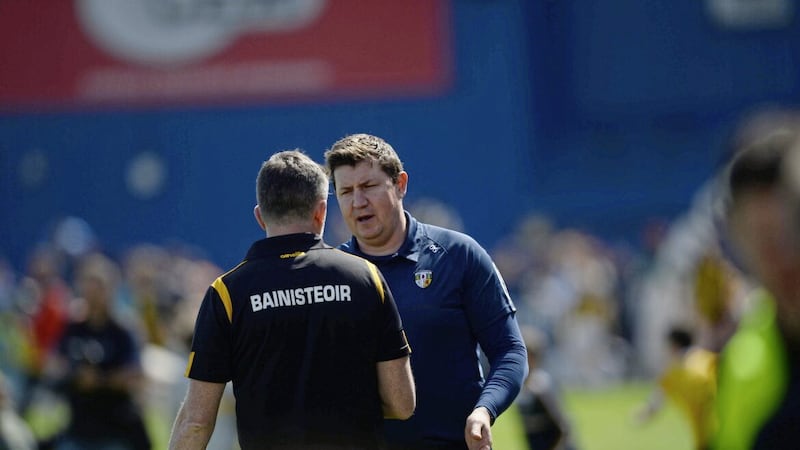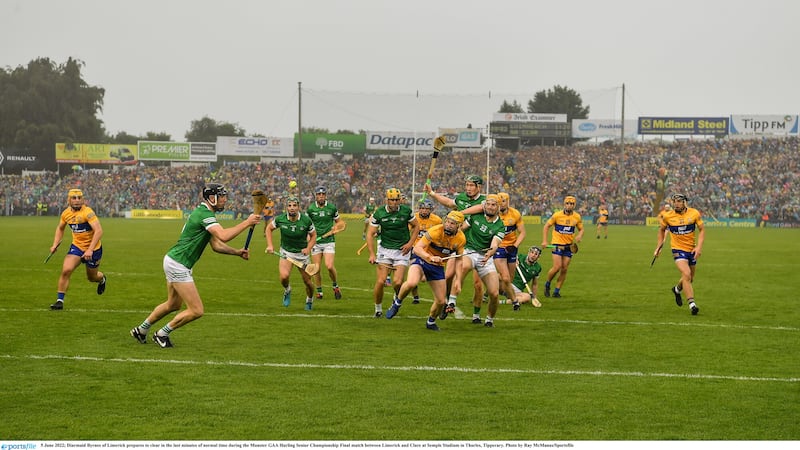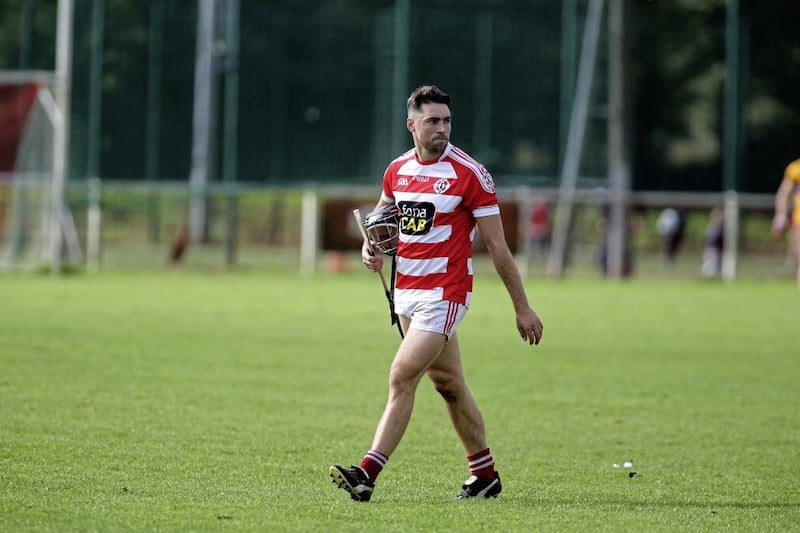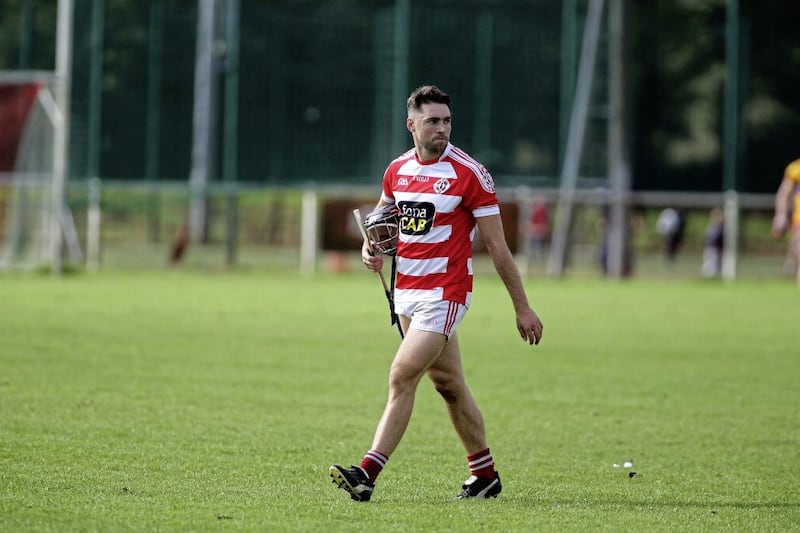Belfast native and former Antrim hurler Cairbre Ó Cairealláin has been fascinated by what makes an elite sportsperson tick. He’s worked across different sporting codes as a strength & conditioning coach and was a key part of the 2019 Tipperary and 2022 Limerick teams that won the Liam MacCarthy Cup. On a recent visit in Belfast, he spoke to Brendan Crossan...
Brendan Crossan: I’m sure growing up you didn’t imagine you’d end up working in S&C...
Cairbre Ó Cairealláin: Strength and conditioning wasn’t a thing in my world. Growing up, there were very few professional teams where strength and conditioning was part of their set-up and it kind of evolved in the early 2000s and became more of a feature.
The GAA would probably have been later again to having S&C as an important part of their set-up. So it wasn’t on my radar at all. I wasn’t thinking of making a career out of it. I just enjoyed it and I suppose I fell into coaching when I was down in Limerick [studying].
I became fascinated with the whole area of high performance and getting the best out of players. My first experience of seeing strength and conditioning as a job I did my internship in Australia in 2009 to Adelaide Crows. It was my first encounter of a professional set-up and I thought then that it was maybe something worth pursuing, career-wise.
Now, I can barely call it a job. I’m just very fortunate to do what I do.
BC: When you’re watching the Limerick hurlers do you find yourself watching them with a different pair of eyes?
CÓC: It’s a good question. Certainly, progressing through the season, you’re looking at developing players and how the young players are coping with the demands of the game and whether they’re physically able to keep up with more established players and opposition.
We’re well aware of the different physical challenges. For example, when we played Clare earlier this year, we were conscious of how quick they got their restarts done from the puck-out. As soon as the ball went dead we needed to have our players turning and sprinting back up the field. You’re looking at games from that point of view.
But I’m not the busiest person on the sideline. I’m able to enjoy the game – now, I didn’t enjoy the All-Ireland final [against Kilkenny] this year because it was too close right to the end.
Sometimes I would have the iPad and I would track the GPS ‘live’ during a game, but you can be stuck just watching the iPad with these numbers coming in. You can learn more with what’s right in front of you.
BC: The Limerick starting XV has barely changed over the last number of years. Would the management team be concerned of the high mileage among the team even though they achieved a fantastic three-in-a-row in 2022?
CÓC: It’s something we have to be aware of that these boys have been on the road for a while now. The age profile is still quite young – mid-20s – but they started young as well. To their credit, they still have this hunger to keep going to the well every year; I’ve heard some of the players at the end of a season saying how it gets harder every year and I think part of the journey for these players as they get older and have more miles in the legs is looking after themselves a bit more. Things that you could get away with when you were a bit younger, when you basically trained hard and ran through walls because your body is so adaptable without having to worry too much about it.
Whereas now it’s a case of keeping on top of recovery protocols. When I was with Tipperary, for example, I was able to observe players towards the end of their careers, the likes of Paudie and Brendan Maher, they were really professional in how much they valued the recovery process – going to the swimming pool, the sauna, doing their stretches, going to the sea – they did that every single week.
So I think that’s something the Limerick players are starting to bring to their preparation every week and it’s something I’m aware of as we go along.
BC: Given the troublesome trajectory of Limerick’s NHL campaign last season, does your role become more nuanced in terms of trying to get the team to peak at certain points of the season?
CÓC: It’s easier to look back and build a story around that. When we started back training in January, the lads had a good break from the last All-Ireland... the League came around and we weren’t getting results. Even though we were training hard we were still looking for performances and they weren’t coming and we were frustrated by that.
We really had to ask questions of ourselves as to exactly what was going on. It wasn’t clear to me that we were just going to get better for the Championship. After the League, I suppose we really did have to look at what we were doing and it was maybe a bit of a wake-up call for us at that stage.
When it came to Championship, we paid more attention to management-load and making sure the team were fresh. I could see in the players when it came to Championship - it wasn’t that they were trying less in the League - but they just had another gear, mentally – just mentally switching on for the job that was ahead of them.
The year ended well but it certainly wasn’t a clear road to us that there was going to be an All-Ireland.
BC: Do you ever sit back and think just how awesome this group of Limerick hurlers are?
CÓC: One hundred percent, yes. I suppose as a hurling man myself I think back to the Kilkenny team of the 2000s, which we were all in awe of at the time, but the reality is this Limerick team aren’t far off in terms of their achievements.
They’re not there yet but I feel they have a lot more in them as well. I think the environment that’s been set up by John and Paul [Kinnerk] and Caroline [Currid], it’s such an enjoyable place to be and the players are thriving in that environment as people and as hurlers. They keep wanting more and keep coming back to get more out of themselves.
BC: Do S&C coaches have a shelf life with a team?
CÓC: It’s something I think about. I’m not entirely sure what the answer is. I suppose when I come into a team, it takes a while to get players on board with a new voice, a new face. Players have different coaches coming in with new ideas and new programmes... I’m looking forward to this second year and the trust you obviously build up between the players and the coaches. You have a lot of contact time with the players and you can build a relationship with them to the point I can have really honest conversations with them. For me, that’s something that I like.
It’s not just the nuts and bolts of programmes – that’s pretty straightforward once you know what the right programme is – it’s the conversations you have with players. After a few years, players could be sick of hearing the same voice, but I suppose that’s down to the coach trying to keep things fresh and approach things in a different way.
BC: What’s been the most exhilarating part of your career to date?
CÓC: When you’re asked that question you automatically think of when the final whistle goes in the All-Ireland final and I’m lucky enough to have experienced that once with Tipp and once with Limerick. I guess they’re magical moments and something I’ll cherish forever; that first 30 seconds when you run onto the field with the players and coaches together.
With those memories, you bond with each other. When I get the chance to meet with some of the Tipp players, it’s always something that we share. It’s very special. But I don’t really rely on those moments to get fulfilment; I really like working with people and trying to help them make progress on the pitch and it’s great to see how it carries over to their lives outside of sport.
BC: What would you like to do with your career going forward?
CÓC: I really don’t think that far ahead and it has kind of served me well. I genuinely just like working with the team I’m in with. But I wouldn’t be surprised in a few years’ time if I decided to do something completely different, unrelated to sport. I guess I like challenges.
I was mad into hurling. I wanted to be a top hurler but I wasn’t really. I never played senior inter-county hurling. I can appreciate top level hurlers and what they do and it was the same when I was with the Arsenal women’s team. They were real professionals. I have an appreciation for the discipline that these kind of people bring to their lives, in terms of doing the simple things every single day. I’ve been inspired by those that I’ve worked with. I’d say I’ve learned as much if not more from them than they have from me.
BC: You are a very passionate member of the Irish-speaking community. Where does that come from?
CÓC: We were reared on Irish at home. It was just normal to us. We wouldn’t have thought much of it when we were young. I lived in London for a few years and I look back and appreciate what we had, the richness of our language, the importance of culture, showing the magic of Irish and what it adds to the fabric of a community...
In today’s world, everything seems to be about computer screens, phones and all this kind of stuff. I think anything that draws us back to what’s real and to our roots is very valuable and you can see what the Irish language has brought to the community in Belfast. It’s such a tight-knit community... My friends and my brothers speak Irish. And seeing Coláiste Feirste thriving, that magic is still there. It’s a language that is very special and belongs to all of us.
